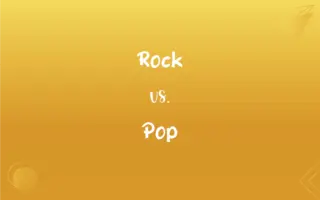Will Be vs. Will Have: What's the Difference?
Edited by Janet White || By Aimie Carlson || Published on November 27, 2023
"Will be" indicates a future state or condition, while "will have" denotes a future possession or completion of an action.

Key Differences
"Will be" is used to express a future state of being or condition, indicating what someone or something will become or how they will exist in the future. In contrast, "will have" is used to show possession, completion, or attainment of something in the future.
When using "will be," the focus is on the future status or condition of the subject. For example, "She will be a doctor" highlights the future profession of the subject. On the other hand, "will have" emphasizes the acquisition or completion of something, as in "She will have completed her degree."
"Will be" often precedes an adjective or a noun to describe the future state, like "The weather will be sunny." Meanwhile, "will have" is usually followed by a past participle to indicate a future action that will have been completed, such as "He will have finished the report."
In terms of grammar, "will be" is the future tense form of "to be," reflecting a continuous or permanent state in the future. Whereas "will have" is the future perfect tense, suggesting a sense of completion or achievement by a specific future time.
"Will be" can be used for predictions, future plans, or expectations about the state of things. In contrast, "will have" is used for actions that will be completed by a certain future point, or when talking about future possessions or experiences.
ADVERTISEMENT
Comparison Chart
Grammatical Function
Future form of "to be"
Future perfect tense
Indicates
Future state, condition, or existence
Future possession, completion, or experience
Sentence Structure
Followed by a noun or an adjective
Followed by a past participle
Usage Context
Used for predictions, plans, or expectations
Used for actions completed by a future time
Example
"Tomorrow will be sunny"
"I will have finished the project by tomorrow"
ADVERTISEMENT
Will Be and Will Have Definitions
Will Be
Reflects a future occurrence or situation.
The store will be closed on Sunday.
Will Have
Used to express a future achievement.
She will have earned her degree by next year.
Will Be
Signifies a future arrangement or plan.
The meeting will be at 3 PM.
Will Have
Implies completion of an action by a future time.
He will have completed the marathon by noon.
Will Be
Used for future predictions or expectations.
It will be cold tomorrow.
Will Have
Reflects accumulation of experiences or actions over time.
They will have traveled to five countries by the end of their trip.
Will Be
Expresses future roles or identities.
They will be parents soon.
Will Have
Indicates possession or acquisition in the future.
By next month, I will have a new car.
Will Be
Indicates a future state or condition.
She will be the team leader next year.
Will Have
Denotes a future state resulting from a completed action.
You will have learned a lot by the end of the course.
FAQs
Is "will be" used with adjectives?
"Will be" is commonly used with adjectives to describe future conditions.
Can "will have" indicate experiences?
Yes, "will have" can indicate future experiences or actions accumulated over time.
How is "will have" used?
"Will have" is used to indicate future possession or completion of an action.
Does "will have" imply future achievement?
Yes, "will have" can imply a future achievement or completion.
Is "will be" used in making predictions?
Yes, "will be" is frequently used in making predictions about the future.
Does "will have" always require a past participle?
Yes, "will have" is typically followed by a past participle.
Can "will be" be used for future plans?
Yes, "will be" is often used for future plans or arrangements.
Can "will have" be used in the context of ownership?
Yes, "will have" often indicates future ownership or possession.
What does "will be" express?
"Will be" expresses a future state, condition, or existence.
Can "will have" indicate a sense of completion?
"Will have" strongly indicates a sense of completion or finality.
Is "will be" a simple future tense?
Yes, "will be" is a form of the simple future tense.
Does "will have" imply future planning?
"Will have" often relates to outcomes of plans or actions set in the future.
Does "will be" involve action?
"Will be" is more about a state or condition rather than an action.
Does "will be" reflect a permanent future state?
"Will be" can reflect both permanent and temporary future states.
How does "will have" relate to time?
"Will have" implies something will be completed by a specific future time.
Is "will be" suitable for weather forecasts?
Yes, "will be" is commonly used in weather forecasts and conditions.
Is "will have" part of the future perfect tense?
Yes, "will have" is used in the future perfect tense.
Can "will be" express roles or identities?
"Will be" can express future roles, identities, or professions.
Can "will be" describe future events?
"Will be" is commonly used to describe or schedule future events.
Can "will have" show accumulation of things?
Yes, "will have" can show accumulation over time, like experiences or achievements.
About Author
Written by
Aimie CarlsonAimie Carlson, holding a master's degree in English literature, is a fervent English language enthusiast. She lends her writing talents to Difference Wiki, a prominent website that specializes in comparisons, offering readers insightful analyses that both captivate and inform.
Edited by
Janet WhiteJanet White has been an esteemed writer and blogger for Difference Wiki. Holding a Master's degree in Science and Medical Journalism from the prestigious Boston University, she has consistently demonstrated her expertise and passion for her field. When she's not immersed in her work, Janet relishes her time exercising, delving into a good book, and cherishing moments with friends and family.






































































